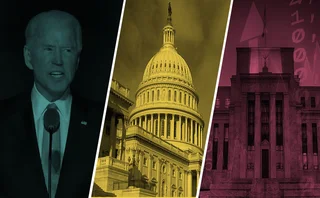
Covid bank tests, swap fix deferred and SOFR switch
The week on Risk.net, October 17-23, 2020

CCP discount switch drives record SOFR swap volumes
Historic move off fed funds discounting leads to trading surge
EU defers legal fix to Brexit swaps trading ban on branches
Efforts to address duplicate Mifir trading obligations stymied by UK-EU negotiations
Covid policy risk hangs over bank stress tests
Banks and regulators are second-guessing the policy response to new outbreaks
COMMENTARY: Lending support
There is one way to be healthy but many ways to be ill. Likewise, Covid-19 has upended normal life in many different ways – as banks are increasingly discovering.
Lenders are struggling to assess credit risk amid uncertainty over government support for jobs. In banks’ internal stress tests, any assumptions of state intervention will need to be supported by convincing data and analysis. Yet on both sides of the Atlantic, the future direction of policy is far from predictable.
After growing unrest among businesses affected by the pandemic, the UK this week announced changes to its new taxpayer-funded scheme to protect livelihoods. US lawmakers, meanwhile, are working to agree a further relief package to bolster the economy ahead of the presidential election on November 3. Again, the outlook is hazy.
Politicians are not the only source of heightened risk. US federal regulators are urging banks to ensure they can withstand the increased operational risks from rapid changes in working practices, along with fraud and cyber threats during the pandemic. And not long ago, banks already had to redesign many of their internal controls to support government stimulus programmes.
More changes are yet to come. Next month, the US Federal Reserve will detail its approach to banks’ operational resilience. Outlining the guidance this week, Arthur Lindo, deputy director at the Fed, said banks would be expected to design idiosyncratic stress scenarios and map interdependencies of core business lines and critical operations.
All this raises the risk of change fatigue. But banks can ill afford it, as it seems constant change is the new normal.
STAT OF THE WEEK
Amid the coronavirus crisis, non-bank financial institutions tapped credit lines with banks to access the cash they thought they needed to ride out the storm. Banks’ cross-border exposures to the so-called shadow banks fell back slightly over the second quarter to $7.33 trillion globally, down 3% on Q1, but it is still up nearly 8% on end-2019, according to the Bank for International Settlements.
QUOTE OF THE WEEK
“I think where there isn’t acceptance is when you’re in a daily fund and that’s gated for however long, whether it be months or weeks. I think clients’ expectations would be a daily fund wouldn’t be gated because otherwise it would be a monthly fund or a quarterly fund… Maybe it’s on page 57 of the prospectus and that’s a long way for the client to read, whereas if you say it’s a monthly fund, they understand it’s a monthly fund” – Darrel Yawitch, chief risk officer for Man Group investments, on being clear with clients on crisis liquidity tools.
Further reading
Only users who have a paid subscription or are part of a corporate subscription are able to print or copy content.
To access these options, along with all other subscription benefits, please contact info@risk.net or view our subscription options here: http://subscriptions.risk.net/subscribe
You are currently unable to print this content. Please contact info@risk.net to find out more.
You are currently unable to copy this content. Please contact info@risk.net to find out more.
Copyright Infopro Digital Limited. All rights reserved.
You may share this content using our article tools. Printing this content is for the sole use of the Authorised User (named subscriber), as outlined in our terms and conditions - https://www.infopro-insight.com/terms-conditions/insight-subscriptions/
If you would like to purchase additional rights please email info@risk.net
Copyright Infopro Digital Limited. All rights reserved.
You may share this content using our article tools. Copying this content is for the sole use of the Authorised User (named subscriber), as outlined in our terms and conditions - https://www.infopro-insight.com/terms-conditions/insight-subscriptions/
If you would like to purchase additional rights please email info@risk.net
More on 7 days in 60 seconds
Bank capital, margining and the return of FX
The week on Risk.net, December 12–18
Hedge fund losses, CLS and a capital floor
The week on Risk.net, December 5–11
Capital buffers, contingent hedges and USD Libor
The week on Risk.net, November 28–December 4
SA-CCR, SOFR lending and model approval
The week on Risk.net, November 21-27, 2020
Fallbacks, Libor and the cultural risks of lockdown
The week on Risk.net, November 14-20, 2020
Climate risk, fixing Libor and tough times for US G-Sibs
The week on Risk.net, November 7-13, 2020
FVA pain, ethical hedging and a degraded copy of Trace
The week on Risk.net, October 31–November 6, 2020
Basis traders, prime brokers and election risk
The week on Risk.net, October 24-30, 2020
Most read
- Podcast: Olivier Daviaud on P&L attribution for options
- SG trader dismissals shine spotlight on intraday limit controls
- For a growing number of banks, synthetics are the real deal








